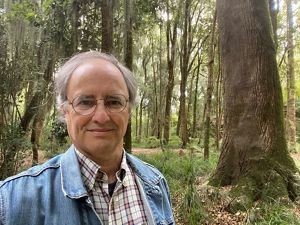Milwaukeeans Lorette Russenberger and Sara Wilson often reflect on how art and nature have been interwoven throughout history. “Art has made vast contributions to humankind’s connection to nature, from the Romantic artists who inspired travels to exotic places to the landscape painters who fostered Americans’ reverence for the West long before many of them had actually seen it,” says Lorette. “Today, much contemporary art draws attention to the risks our environment is up against.”

Growing up, Lorette explored Milwaukee’s many art museums, galleries, city parks and gardens with her mother. “Learning to appreciate beauty in one form enabled me to appreciate it in others,” she says. Not surprisingly, she found career pursuits that allowed her to tap into her passion for both art and nature: She has owned businesses that conserved art and historic buildings, and she founded an eco-friendly natural ribbon manufacturing company. Today, you can find her working with raptors and educating people about nature.
Sara was raised in San Marcos, Texas, where she often admired the cypress-lined river that runs through town. She developed a love for the outdoors while hunting and fishing with her father and has always felt that art reinforces her connection to nature. “When I look at art, especially of the Texas Hill Country and the San Marcos River—my home soil and water—my senses are flooded with the sounds, smells and memories of those areas,” she says. “Art is a window in to—I do mean in to, not into—the world.”
Sara worked for The Nature Conservancy in Texas and later in the Caribbean, where she and Lorette met while working on an environmental volunteer service project. In 2000, Sara moved to Milwaukee and founded a consulting firm that aims to strengthen organizations’ abilities to be sustainable and conserve land. Her office— and the residence she shares with Lorette—is a renovated 19th-century tavern, complete with a fully landscaped green roof that captures rainwater and a native garden (converted from a parking lot) that has been certified as wildlife habitat by the National Wildlife Federation.
Quote: Sara Wilson

Whether it’s making a charitable gift for conservation or depicting natural beauty on canvas and bringing nature to everyone, we all can have positive ripple effects on the world.
Creating this zero-runoff home is one of many ways the couple supports conservation today— but they also wanted to help nature tomorrow. They decided to establish charitable gift annuities, which provide them with immediate income and tax benefits and will support TNC’s work in the future. “Because of the income we receive, we are able to give more now,” Lorette says
They also made a legacy gift commitment by including TNC in their estate plans. “Everyone has the opportunity to create a legacy,” Sara says, “Whether it’s making a charitable gift for conservation or depicting natural beauty on canvas and bringing nature to everyone, we all can have positive ripple effects on the world."



